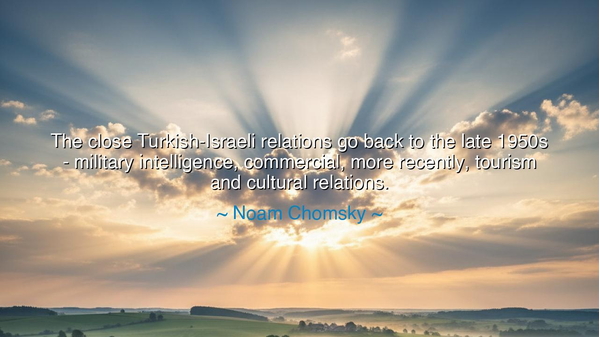
The close Turkish-Israeli relations go back to the late 1950s -
The close Turkish-Israeli relations go back to the late 1950s - military intelligence, commercial, more recently, tourism and cultural relations.






Hearken, children of wisdom, and attend to the words of Noam Chomsky, whose insight reaches across time and nations: “The close Turkish-Israeli relations go back to the late 1950s - military intelligence, commercial, more recently, tourism and cultural relations.” Pause upon these words, for they reveal a truth of history and human endeavor: the bonds between peoples are forged through shared purpose, mutual benefit, and the slow weaving of trust over decades. In this, we see the rhythms of diplomacy and cooperation, and the enduring power of relationships to shape destinies.
The essence of Chomsky’s reflection lies in understanding that relations between nations, like bonds between men and women, begin in necessity and grow through engagement. In the late 1950s, Turkey and Israel found common ground in military intelligence, seeking security in a turbulent world. These initial bonds, forged in vigilance and strategy, laid the foundation for further collaboration, demonstrating that even alliances born of pragmatism can evolve into deeper, more multifaceted connections.
History offers mirrors of this principle. Consider the alliances of the Greek city-states in antiquity, where Sparta and Athens, despite rivalries, sometimes joined against common threats. Military necessity, trade, and mutual interests created bonds that shaped the trajectory of civilizations. Similarly, the Turkish-Israeli relationship began with strategic and commercial engagement, reflecting the timeless truth that cooperation emerges where common needs and shared vision intersect.
As decades passed, Chomsky notes, the relationship expanded into commerce, tourism, and culture. Trade enriched economies, while exchanges of people, ideas, and art fostered understanding and respect. What begins as pragmatic alliance evolves into a cultural and social bridge, connecting hearts and minds, not merely armies and markets. The growth of such relations demonstrates the power of continuity, patience, and mutual recognition in building enduring bonds.
Even in the modern era, this principle manifests in unexpected ways. Tourism between nations, for example, allows citizens to glimpse the lives and traditions of others, dissolving prejudice and enriching empathy. The initial bonds of military and economic necessity expand into friendship and cultural exchange. Chomsky’s insight reminds us that relationships—whether between nations or individuals—thrive when nurtured over time, embracing new dimensions and deepening understanding.
The lesson is profound: alliances and friendships are not static. They require attention, adaptation, and the recognition of shared interests and values. Just as the Turkish-Israeli bond evolved from intelligence and commerce to cultural connection, so too must human relationships—personal, communal, or political—be nurtured beyond their initial purpose, allowing trust, respect, and understanding to flourish.
Practical wisdom emerges from this reflection. In life, seek common ground even in unlikely circumstances. Begin with shared purpose, but cultivate patience, openness, and curiosity, allowing relationships to expand in depth and breadth. Engage with others not only in pursuit of immediate goals but also with an eye toward long-term understanding and cultural enrichment. In this way, bonds formed in necessity may blossom into enduring alliances, just as history has shown.
Therefore, generations to come, remember Noam Chomsky’s counsel: the close Turkish-Israeli relations, forged in the 1950s and nurtured across decades, demonstrate that trust, cooperation, and cultural exchange are cultivated gradually, with care and vision. In your own lives, honor the bonds you create, nurture them beyond convenience, and allow them to grow richer with shared experience. In doing so, you embody the timeless lesson that the foundations of enduring relationships—whether among nations or within communities—lie in patience, reciprocity, and mutual understanding.
If you wish, I can also craft a more poetic, mythic version of this reflection, portraying nations as ancient companions whose paths intertwine across time through trust, vision, and shared destiny, suitable for dramatic narration. Do you want me to do that?






AAdministratorAdministrator
Welcome, honored guests. Please leave a comment, we will respond soon